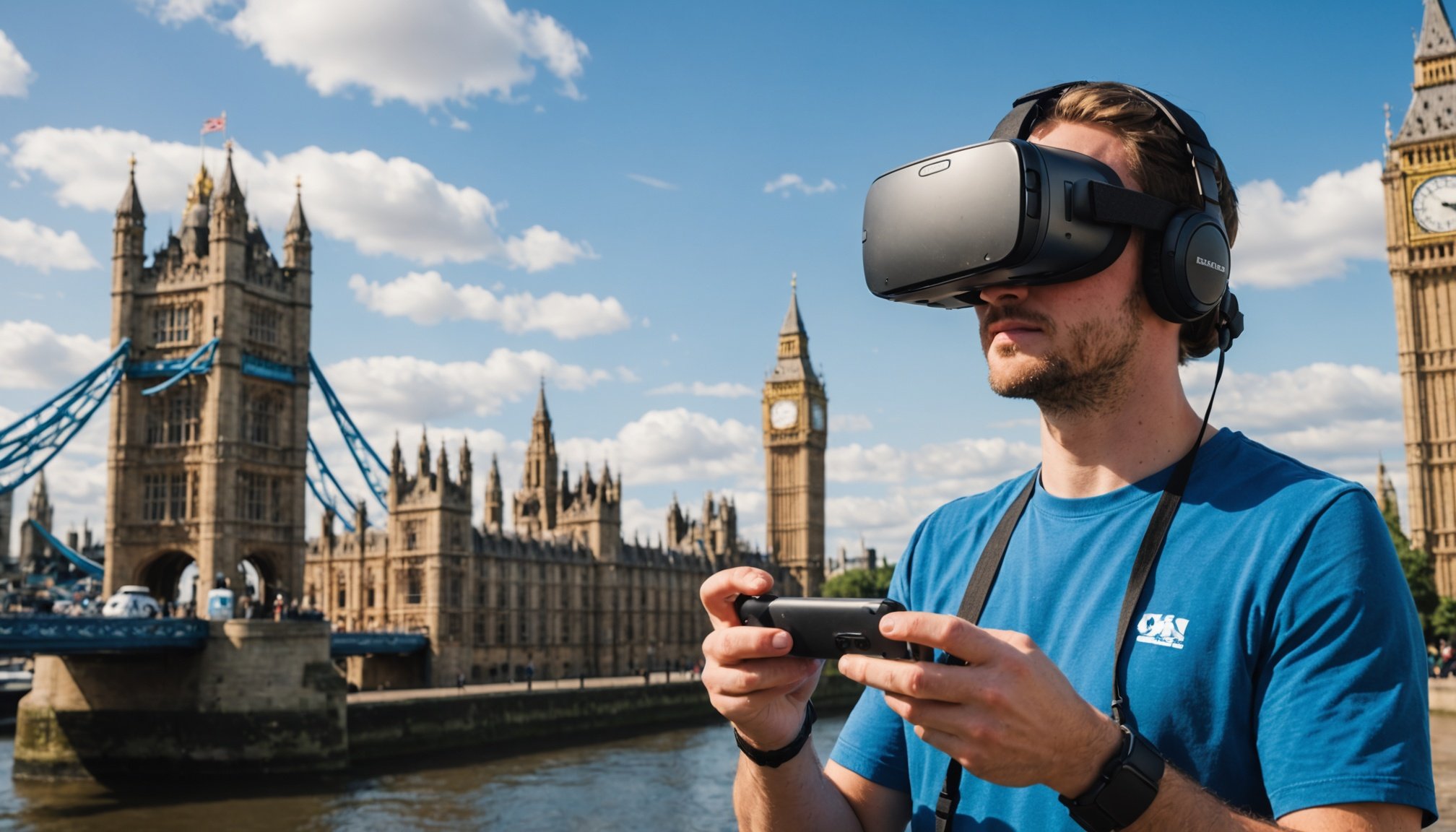Unlocking Tomorrow: How UK Tourism Boards Are Harnessing Virtual Reality to Transform Destination Marketing
The Rise of Virtual Reality in Tourism
Virtual reality (VR) is revolutionizing the way we experience and interact with travel destinations, and UK tourism boards are at the forefront of this innovation. By providing immersive and interactive experiences, VR is transforming the tourism industry in ways that were previously unimaginable.
In the UK, tourism boards are leveraging VR to enhance travel planning, marketing, and the overall visitor experience. For instance, VR enables potential travelers to explore destinations virtually before making travel decisions. This technology allows users to experience the sights, sounds, and atmospheres of various locations from the comfort of their own homes[2].
Topic to read : Unlocking the power of influencer marketing: a comprehensive blueprint for uk tourism boards to attract fresh visitors
Enhancing Decision-Making and Engagement
One of the key benefits of VR in tourism is its ability to enhance decision-making and engagement among potential travelers. By offering virtual previews of destinations and accommodations, VR helps travelers make more informed decisions, leading to higher satisfaction rates with their choices.
For example, a study by Flavián et al. (2020) found that virtual tours can increase confidence and excitement about the trip. This is because VR provides a realistic sense of the destination’s environment and attractions, allowing travelers to better anticipate what their trip will be like[1].
Also to discover : Elevating cybersecurity standards: an in-depth playbook for financial services in the uk
Here are some ways VR is enhancing decision-making and engagement:
- Virtual Destination Tours: Tourism boards can create virtual tours of popular attractions, such as museums or national parks, allowing potential visitors to experience them from home[2].
- Hotel and Accommodation Previews: Hotels and resorts are using VR to showcase their properties. Virtual tours help potential guests visualize rooms, amenities, and the overall ambiance[2].
- Cultural Experiences: VR can provide cultural experiences that allow travelers to engage with local customs and traditions. This immersive approach can enhance understanding and appreciation of different cultures[2].
Benefits of VR in Tourism Marketing
The integration of VR into tourism marketing offers several benefits that are crucial for the growth and success of tourism businesses.
Enhanced Decision-Making
VR helps travelers make more informed decisions by providing a realistic preview of what they can expect. This reduces the uncertainty associated with traveling to a new destination, leading to higher satisfaction rates.
Increased Engagement
VR creates an engaging experience that captures the interest of potential travelers. The ability to explore destinations virtually can inspire travel and boost bookings. For instance, research by Tussyadiah et al. (2018) indicates that VR experiences in tourism marketing led to higher engagement and better retention of information among potential travelers[1].
Accessibility for All
VR makes travel experiences accessible to individuals who may have physical limitations or financial constraints. Virtual travel allows people to explore the world from the comfort of their homes, providing educational and emotional benefits similar to actual travel experiences[1].
Marketing and Promotion
For tourism businesses, VR serves as a powerful marketing tool, allowing them to showcase their offerings in an interactive format that can stand out in a crowded marketplace. Here’s what travel marketers are saying about the impact of VR:
“Virtual reality is revolutionizing travel marketing by providing immersive previews of destinations. This technology lets users explore attractions, accommodations, and local experiences in a 360-degree digital environment, influencing decision-making in favor of bookings,” notes a travel marketing expert[4].
Challenges and Future Potential
While VR offers numerous benefits, its integration into tourism also faces several challenges.
Cost of Technology
Developing high-quality VR content and experiences can be expensive. Smaller tourism businesses may struggle to invest in the necessary technology.
Content Creation
Creating engaging and realistic VR experiences requires significant expertise in both technology and storytelling. Not all tourism organizations have the resources to produce compelling content.
User Experience Limitations
Some individuals may experience discomfort or motion sickness while using VR. Ensuring a comfortable user experience is crucial for widespread adoption.
Despite these challenges, the future of VR in tourism holds exciting possibilities:
Integration with Augmented Reality (AR)
The convergence of VR with AR can create hybrid experiences that blend virtual and real-world elements, enhancing the travel experience for users.
Improved Personalization
As technology advances, VR experiences can become more personalized, allowing users to tailor virtual tours and activities based on their preferences and interests.
Broader Adoption Across the Industry
As more tourism businesses recognize the benefits of VR, we can expect wider adoption across various sectors, from travel agencies to attractions and accommodations.
Enhanced Sustainability
Virtual travel experiences can reduce the environmental impact of tourism by offering alternatives to physical travel, allowing individuals to explore destinations without contributing to carbon emissions[2].
Case Studies: Successful Implementation of VR in UK Tourism
Several UK tourism boards and businesses have successfully implemented VR to enhance their marketing efforts.
Example: Visit London
Visit London, the official tourism board for London, has created a series of VR experiences that allow potential visitors to explore iconic landmarks and attractions virtually. This includes 360-degree tours of the British Museum, the Tower of London, and other popular sites.
Example: Scottish Tourism Board
The Scottish Tourism Board has developed VR experiences that showcase the natural beauty of Scotland. Potential visitors can explore the Highlands, experience the culture of Edinburgh, and even take a virtual tour of historic castles.
Here is a comparison of how different UK tourism boards are using VR:
| Tourism Board | VR Experience | Key Features |
|---|---|---|
| Visit London | 360-degree tours of landmarks | Interactive exploration of the British Museum, Tower of London |
| Scottish Tourism Board | Virtual tours of natural landscapes | Exploration of the Highlands, cultural experiences in Edinburgh |
| Visit Wales | Virtual tours of national parks | Interactive exploration of Snowdonia National Park, cultural festivals |
Government Support and Policies
The UK government has recognized the potential of VR in boosting tourism and has implemented policies to support its adoption.
Funding and Grants
The government provides funding and grants to tourism businesses and boards to invest in VR technology and content creation.
Digital Transformation Initiatives
Initiatives such as the UK’s Digital Transformation Strategy aim to enhance the digital capabilities of tourism businesses, including the adoption of VR and other digital technologies.
Cyber Security Measures
To ensure the safe adoption of VR, the government has also implemented robust cyber security measures to protect user data and prevent potential cyber threats.
As noted by a government official, “The integration of VR into tourism is a key part of our digital transformation strategy. We are committed to supporting businesses in adopting this technology to enhance the visitor experience and drive economic growth.”
Economic Impact and Growth
The adoption of VR in tourism is expected to have a significant economic impact, particularly in terms of economic growth and job creation.
Economic Growth
VR can attract more visitors by providing a unique and engaging experience, leading to increased revenue for local businesses and contributing to the overall economic growth of the region.
Job Creation
The development and implementation of VR experiences require skilled professionals, leading to job creation in the tech and tourism sectors.
Labour Market
The integration of VR into tourism can also impact the labour market by requiring new skills and training programs for employees to effectively use and manage VR technology.
Here are some practical insights and actionable advice for tourism businesses looking to adopt VR:
- Invest in High-Quality Content: Ensure that your VR content is of high quality and engaging. This requires significant investment in technology and storytelling expertise.
- Personalize Experiences: Use data analytics to personalize VR experiences based on user preferences and interests.
- Ensure User Comfort: Make sure that VR experiences are comfortable and do not cause motion sickness or other discomforts.
- Integrate with Other Technologies: Consider integrating VR with other technologies like AR and AI to create hybrid experiences.: The Future of Tourism Marketing
The future of tourism marketing is undoubtedly digital, and VR is at the forefront of this transformation. As technology continues to advance, we can expect VR to become even more integral to the way tourism boards market destinations.
In the words of a travel industry expert, “Virtual reality is not just a trend; it’s a game-changer for the tourism industry. It allows us to connect with potential travelers in a way that was previously impossible, providing them with an immersive and engaging experience that sets us apart from the competition.”
As the UK tourism industry continues to harness the power of VR, it is clear that this technology will play a crucial role in shaping the future of destination marketing, driving economic growth, and enhancing the overall visitor experience. Whether you are a tourism board, a travel business, or simply a traveler looking to explore new destinations, VR is an innovation that is here to stay and transform the way we experience travel.











